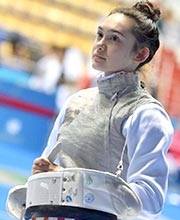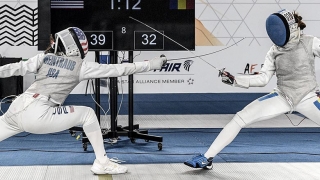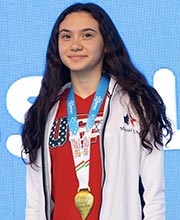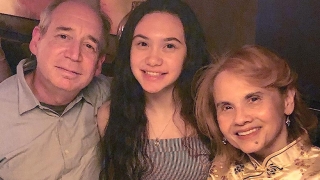Elite Athlete Injuries: Maia’s Story
Published on
Published on
When Maia’s two uncles encouraged her to try fencing at age 9, she never dreamed how far it would take her. In the past decade, she’s competed at tournaments across the United States and on four continents. She’s risen from novice to one of the top-ranked female fencers in the nation. And now, she’s hoping to become a member of an elite group of U.S. athletes competing in the Summer Olympic Games.
Maia’s path has not been without physical challenges. And that’s where the Sports Medicine and Performance Center at Children’s Hospital of Philadelphia (CHOP) comes into her story.
Through the years, Maia has sustained multiple fractures, sprains, strains, tendonitis and other issues related to competing or training. Each time, a dedicated team of physicians and therapists from CHOP helped her recover and taught her how to prevent new injuries so she could quickly return to the sport she loves.
 Maia preparing to fence at the 2020 Kazan World Cup. Courtesy A. Bizzi / FIE
Maia began fencing at the encouragement of her uncles, both former fencers at Harvard University. With the support of her parents, Jason and Elizabeth, Maia joined the Fencing Academy of Philadelphia, where she tried her hand at fencing’s three disciplines – sabre, epee and foil – before choosing to focus on foil.
Maia preparing to fence at the 2020 Kazan World Cup. Courtesy A. Bizzi / FIE
Maia began fencing at the encouragement of her uncles, both former fencers at Harvard University. With the support of her parents, Jason and Elizabeth, Maia joined the Fencing Academy of Philadelphia, where she tried her hand at fencing’s three disciplines – sabre, epee and foil – before choosing to focus on foil.
As Maia mastered the basic blade work and footwork she’d need in fencing, she threw herself into the sport, spending more time practicing, thinking about tactics and urging her parents to allow her to compete locally, then nationally, then internationally.
One of Maia’s earliest fencing injuries was a pulled hamstring. Her parents brought her to CHOP, where she first met Jamila Aberdeen, DPT, PT, OCS. The physical therapist would grow to become a consistent ally in Maia’s fencing journey, serving as both supporter and confidant through the years.
 Maia battling an opponent the 2021 Junior World Fencing Championship in Cairo, Egypt. Courtesy A. Bizzi / FIE
At age 10, Maia began competing at regional fencing tournaments in Philadelphia, New Jersey and New York. “I thought this was something I could be really good at and wanted to see how far I could go,” Maia said. Her parents agreed.
Maia battling an opponent the 2021 Junior World Fencing Championship in Cairo, Egypt. Courtesy A. Bizzi / FIE
At age 10, Maia began competing at regional fencing tournaments in Philadelphia, New Jersey and New York. “I thought this was something I could be really good at and wanted to see how far I could go,” Maia said. Her parents agreed.
As Maia pushed herself to improve, she began competing against older opponents to learn new attacks and defensive moves. Over the next few years, she returned to CHOP with a variety of injuries – some more serious than others – and was treated by sports medicine experts including Naomi Brown, MD, FAAP, CAQSM, Theodore J. Ganley, MD, Lawrence Wells, MD, and Matthew F. Grady, MD, FAAP, CAQSM.
After repeated injuries, Maia’s dad expressed concern about whether her sports’ one-sided dominance – and its affects to her body symmetry – played a role in her injuries. CHOP doctors acknowledged Jason’s fears and developed a customized conditioning and nutrition program to improve Maia’s overall physical fitness, her sport-specific skills and strength to excel in her chosen sport.
“We spent a lot of time with Maia and her parents discussing how Maia could prevent injuries and enhance her performance,” Dr. Brown says. Maia was taught the importance of strengthening and conditioning both sides of her body, not just her right arm that held the foil or her right leg that led her attacks. By creating more symmetry in her body’s muscles and taking time to rest and recover when she had minor injuries, she was able to avoid more serious injury.
 Maia won three gold medals – the most of any American fencer – at the 2019 European Maccabi Games in Budapest. Courtesy K. Kowalski
When Maia was 13, her parents began taking her to New York City two or three times a week to train at the Fencers Club, an elite training center in Manhattan and the oldest fencing club in the Western Hemisphere. After a full day of high school, she’d travel to New York, have fencing class, sparring practice and sometimes an individual lesson before heading back home.
Maia won three gold medals – the most of any American fencer – at the 2019 European Maccabi Games in Budapest. Courtesy K. Kowalski
When Maia was 13, her parents began taking her to New York City two or three times a week to train at the Fencers Club, an elite training center in Manhattan and the oldest fencing club in the Western Hemisphere. After a full day of high school, she’d travel to New York, have fencing class, sparring practice and sometimes an individual lesson before heading back home.
Maia began competing in national and international fencing tournaments. Her skills and technique continued to improve the more she competed. In 2019, Maia became one of the youngest fencers to win the USA Fencing Division I National Championship, took a bronze in the London Junior World Cup, and placed eighth in the Cadet World Championships.
“Going to the Cadet World Championships was a huge goal of mine,” Maia says. “It helped me gain more confidence and spurred me to create even bigger goals.”
Her winning streak continued into early 2020 but hit a major snag in March: COVID-19.
Maia’s training regime changed overnight. Without being able to train at her clubs, Maia and her parents worried she might lose some of her hard-earned skills. Again, they turned to the Sports Medicine team at CHOP for support and guidance.
Through virtual visits, CHOP’s medical and therapy teams were able to guide Maia’s training during this transition period. They encouraged her to focus on strength building, movement training and studying videos of prior matches to consider how she might do things differently.
In late 2020, Maia’s training facilities opened up to limited personnel and with a host of restrictions designed to keep athletes safer. For one thing, she and her peers had to wear a face mask under the protective face shield required by the sport. Maia gladly complied, excited to return to competition.
In March 2021, Maia was one of 8 female foil fencers in the country invited to the Olympic Training Center in Colorado. Each athlete had to quarantine for a week before they were allowed to train together.
She’s now part of the Junior U.S. National Fencing Team, which only includes four female foilists in her age group.
 Maia, 18, and her parents Jason and Elizabeth.
Aside from fencing, Maia, now 18, is focused on completing her senior year of high school and looks forward to attending Princeton University in the fall.
Maia, 18, and her parents Jason and Elizabeth.
Aside from fencing, Maia, now 18, is focused on completing her senior year of high school and looks forward to attending Princeton University in the fall.
She’s determined to make her Olympic dream come true – whether it’s this year, in 2024 or beyond. “I never predicted I’d be this close to the Olympics,” Maia says. “But when I’m on the piste (fencing strip), everything else fades away: It’s just me and my opponent – and I love every minute of it.”
Maia says she would not have gotten to where she is now without the support of her parents, physicians at CHOP and her favorite physical therapist, Jamila Aberdeen.
“Jamila made me work hard, and always found room in her schedule to see me or talk to me,” Maia says. “And whenever I see Dr. Wells or Dr. Brown, they ask about my fencing and latest matches.”
“They care about me – not just my injuries – and that’s played a huge role in my recovery and success.”